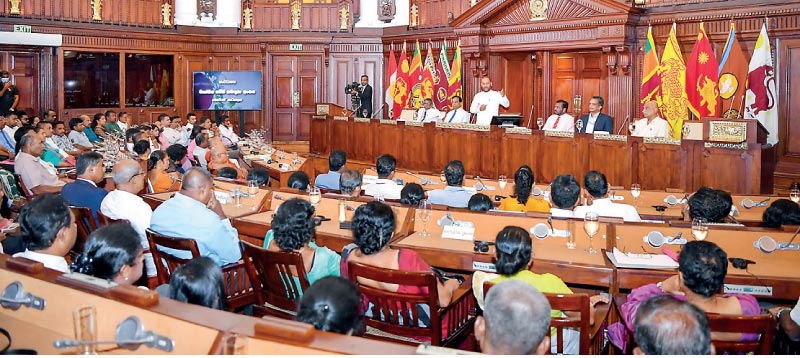Saturday Feb 21, 2026
Saturday Feb 21, 2026
Friday, 25 August 2023 03:11 - - {{hitsCtrl.values.hits}}

Agriculture Minister Mahinda Amaraweera has affirmed that the need for rice imports from foreign sources is unnecessary, given the ample existing rice stocks that can sustain until the upcoming Maha season.
He highlighted the success of the previous season, attributing it to the prompt supply of all essential fertiliser types to farmers, along with financial concessions, and robust yields in regions unaffected by drought further contributing to the season’s prosperity.3
Addressing an expert gathering organised by the President’s Trade Union Relations Division at the Presidential Secretariat on the subject of ‘Modernisation of the Agro-Industrial Sector and its Challenges,’ Minister of Agriculture Mahinda Amaraweera elaborated on the agricultural landscape. He conveyed his perspectives on the imperative of enhancing the agro-industrial domain to meet contemporary challenges.
These insights underscore the Ministry’s dedication to optimising the agricultural landscape while affirming the nation’s ability to meet its rice requirements through robust domestic resources.
Minister Amaraweera further elaborated on the matter, stating: “At the commencement of President Ranil Wickremesinghe’s presidency, a pivotal challenge was to strengthen farmers’ engagement with agricultural land, redirecting them from protest platforms. This endeavour was initiated during a period of cultivation preparation. Despite the target of cultivating 275,000 hectares, the unavailability of fertilisers posed a significant obstacle. While some were criticised for causing undue alarm, even the international community anticipated a potential food scarcity.
“With concerted efforts, we managed to motivate farmers to return to their fields. This dedication resulted in the cultivation of 512,000 hectares during the Yala season, a decade later. Furthermore, approximately 800,000 hectares were cultivated during the Maha season. During that particular year, our nation imported 800,000 metric tons of rice. However, the impending prospect of importing rice this year presents a significant predicament. This challenge is further compounded by India’s current embargo on rice exports.”
Minister Amaraweera’s comments underscored the difficult hurdles inherent in safeguarding domestic food security, shedding light on the particulars of organising agricultural resource management on a global level.
“Nevertheless, owing to the accomplishments of the season and the cautious supply of all three essential fertilisers coupled with financial assistance, we possess ample rice reserves to bridge the gap until the forthcoming harvest of the Maha season.
“Furthermore, despite the current drought conditions leading to the devastation of approximately 75,000 acres, provinces unaffected by this dry weather spell are experiencing notably high yields. Consequently, there remains no necessity to resort to rice imports from other countries.
“The prevailing escalation in rice prices has drawn attention and necessitates effective management. As the Minister of Agriculture, I perceive the rise in paddy prices as a positive development, yet it is imperative to avert any inconvenience to consumers. To this end, it is vital to establish an appropriate framework for regulating paddy and rice prices. Addressing this challenge is pivotal to optimising harvests from our limited arable land. Acknowledging inadequate farmer awareness as a contributing factor, it is evident that farmer leaders with divergent political orientations have not uniformly disseminated accurate information to the farming community.”